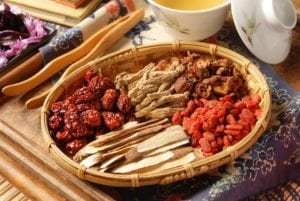Herbal Medicine for Mesothelioma Treatment: A Case Report

A group of South Korean doctors have published an account of a patient who is keeping his cancer at bay with herbal medicine for mesothelioma.
The man elected not to undergo the radical surgery known as extrapleural pneumonectomy. He tried Korean herbal medicine for mesothelioma with the understanding that he would switch to chemotherapy if his condition got worse.
After nearly two years on the herbal combination alone, doctors say his cancer has not progressed. The case is significant because mesothelioma often claims the lives of patients within a year of diagnosis.
What is Korean Herbal Medicine for Mesothelioma?
Traditional Korean herbal medicine dates back more than 3000 years. This alternative health practice has a strong mind-body component. It also includes influences from Chinese, Japanese, and Vietnamese medicine.
A number of herbs are used in Korean traditional medicine as well as edibles like garlic and wormwood. These herbal combinations are the subject of numerous cancer studies.
The latest case report of herbal medicine for mesothelioma focuses on a 49-year-old man with Stage 3 cancer. The man has pleural mesothelioma which grows on the membrane around the lungs. It is caused by asbestos exposure and it is often fatal within 12 to 18 months.
Fighting Mesothelioma with Herbs
Mesothelioma treatment usually includes a combination of therapies such as chemotherapy, radiotherapy, or immunotherapy. Patients who are healthy enough may undergo surgery.
The patient in the Korean herbal medicine case study was recommended for EPP surgery. During EPP (extrapleural pneumonectomy), surgeons remove the affected lung and the pleural membrane. They also remove other tissues where mesothelioma could spread.
EPP is a radical and risky approach. Study results are mixed on whether it extends survival. The patient decided not to have EPP. He tried Korean herbal medicine for mesothelioma instead.
“A KHMT regimen, consisting of twice-daily Gunchil-dan and thrice-daily Bangam-tang, was initiated in December 2017,” writes Dr. Sung Soo Yoon from the Kyung Hee University Hospital at Gangdong. “Since commencement of KHMT, computed tomography and X-ray imaging scans have shown no significant interval changes and progression.”
Slowed Mesothelioma Progression with No Complications
The herbs used in the new Korean case study have been the subject of other cancer studies. A 2018 meta-analysis of 48 studies of Korean herbal medicine for lung cancer concluded that the practice improves survival without adverse effects.
The new case study draws the same conclusion about herbal medicine for mesothelioma. By September 2019, the patient had been on the regimen for 21 months. For mesothelioma, this counts as prolonged survival.
“This case, therefore, suggests that KHMT is a potential treatment option for MPM patients,” the report concludes.
Although this patient did not appear to have any bad effects from the treatment, not everyone trusts Korean herbal medicine. In South Korea, Oriental medicine practitioners do not have to disclose their ingredients or conduct clinical trials. Mesothelioma patients should always discuss proposed alternative therapies with their physician.
Sources:
Han, G, et al, “Systematic Review of Case Reports about Korean Medicine for Lung Cancer”, December 2018, Journal of Korean Medicine, https://www.jkom.org/journal/view.php?number=4918
Yoon, SS, et al, “Prolonged Progression-Free Survival in a Patient With Malignant Pleural Mesothelioma Following Korean Herbal Medicine Treatment Alone: A Case Report”, Jan. 2020, Integrative Cancer Therapies, https://journals.sagepub.com/doi/10.1177/1534735420908345
“The Utilization of Traditional Herbal Medicine for Treatment in Traditional Korean Medicine Clinics”, August 2019, https://www.intechopen.com/online-first/the-utilization-of-traditional-herbal-medicine-for-treatment-in-traditional-korean-medicine-clinics





